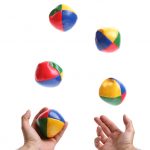I Have ADHD. Now What?
ADHD affects conservatively about 5-8% of the world’s population. With the world’s population being around 7 billion…that’s a lot of people struggling with inattention, impulsivity or distractibility! Since math has never been my best academic subject, comprehending such a number has always been a bit hard for me. I guess it means that if I’m sitting in a room of 30 people, at least two or three of those people have a creative, overly active, easily distractible brain just like mine. Or when my child struggles in school, I know I am not alone, because approximately 200 other students/families are struggling with the same academic, homework, discipline and family chaos that me, my child and my family are experiencing.
If you or someone you love has just been diagnosed with ADHD…congratulate yourself on a job well done! You have had to persevere to find answers to daily struggles, knowing that the answer may not be what you wanted to hear. However, left undiagnosed, children with ADHD are more likely to struggle with low self-esteem, poor social relationships and low academic scores. Undiagnosed ADHD adults are more likely to lose their jobs, feel dissatisfied with their lives, and experience divorce at two times higher than the general public. Knowing that you or that a loved one’s behaviors and challenges are the result of having ADHD is the first step to finding out how to better manage it, decrease the chaos, stop struggling and live life differently. 
Gathering support
If you have just realized you have ADHD, finding resources and going through the treatment maze of ADHD alone can be a challenge. Gather your supporters, resources, friends, and family who are willing to support you in finding answers. Unfortunately, not everybody will offer their support. What about those that don’t “believe” in ADHD? Well, let them know you will get back to them later, and give yourself a little space from them. Right now you need all the positive help and reassurance you can get.
Telling others
Many newly-diagnosed people wonder who they should tell about their condition. Should they tell their co-workers, spouse, parents, friends, family? I encourage you to tell on an “as needed” basis. Unfortunately, many people still do not believe in ADHD and can undermine your efforts or enthusiasm to find help. If you are a parent with a child recently diagnosed, consider your child’s age when you decide what to tell them and how much information to give. I find that normalizing ADHD with children is a great approach. ADHD is an explanation for behaviors, not an excuse. Explain to your child that everyone has things they do easily and things that they have to work hard at to be able to do. For your child, ADHD might mean they will have to work a bit longer on homework, memorizing facts or learning how to write an essay. It doesn’t mean that they can’t learn or do anything….it just means they may have to put extra effort into focusing, planning, organizing, etc.
Deciding on treatment
Next, determine how you want to go about managing your symptoms. For some people, this means working with a medical doctor and using medication. Others want to try alternative treatments such as biofeedback or nutritional supplements. Cognitive-behavioral therapy can be useful for some as they work through old beliefs and behaviors that undiagnosed ADHD has contributed to. For many, the most powerful key to finding success involves a multi pronged approach including working with a well-trained, certified ADHD coach. ADHD coaches specializes in helping people with ADHD, understands their brain so they can design specific strategies to better manage their challenges and get things done. Coaching can be a great addition to your support team of personal supporters, medical providers or alternative health practitioners.
Being newly diagnosed with ADHD is the opportunity to begin living and experiencing life in a totally new way. Remember, you are not alone…3 and half million people are right there with you!
APA Reference
Dupar, L.
(2012, January 26). I Have ADHD. Now What?, HealthyPlace. Retrieved
on 2026, March 5 from https://www.healthyplace.com/blogs/livingwithadultadhd/2012/01/i-have-adhd-now-what